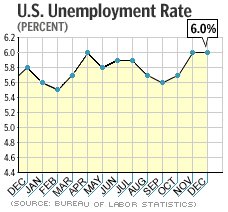NEW YORK (CNN/Money) -
New weekly claims for jobless benefits in the United States rose last week, the government said Thursday, as the labor market struggled to recover from heavy job cuts in 2001 and 2002.
The Labor Department said the number of Americans filing new claims for unemployment benefits rose to 381,000 in the week ended Jan. 18 from a revised 363,000 the prior week. Economists, on average, expected 383,000 new claims, according to Briefing.com.
The gain followed a precipitous drop in the Jan. 11 week, when claims fell from 392,000. Any level at or above 400,000 is usually considered by economists to be a sign of a weak labor market.

The weekly claims figures are notoriously volatile, and the Labor Department warned that claims for the Jan. 18 week could be revised even more than usual, since the Martin Luther King Jr. holiday on Jan. 20 left the department with less time than usual to process the information.
"Through the volatility, the trend in claims is gradually downward again, consistent with the labor market slowly starting to regain momentum after a setback in late 2002," UBS Warburg chief U.S. economist Maury Harris said in a research note.
The report had little impact on U.S. stock prices, which were mixed in early trading. Treasury bond prices fell.
The U.S. labor market has been slow to recover from more than 1.8 million job losses during a recession that began in 2001 and might have ended in 2002.
Businesses, who are sitting on a small mountain of unused production capacity and are worried about the possibility of a U.S.-led war in Iraq, have been squeezing more work out of fewer workers to help sustain their profits through the economic downturn.
As a result, the more than 8.6 million Americans are having a hard time finding jobs, and the unemployment rate has been at or about 6 percent since December 2001.
Policy makers at the Federal Reserve, after cutting interest rates 11 times in 2001 and again late in 2002, are scheduled to meet next week to discuss ways to help the economy.
Most economists expect the Fed to leave their target for a key short-term rate alone -- it's already at its lowest point since 1961 -- but President Bush and Congress are debating other ways to stimulate the economy.
Bush and his fellow Republicans think the best way to do that is through tax cuts and other incentives they think will stimulate business investment. Democrats prefer more direct methods, such as giving money to cash-strapped states. The final result will likely include a little of both philosophies.
In Thursday's report, the four-week moving average, which irons out the ups and downs of the weekly numbers, dipped to 386,500 in the week ended Jan. 18 from a revised 388,500 the prior week.
The number of continued claims -- people drawing benefits for more than a week -- rose to 3.4 million in the week ended Jan. 11, the latest data available, from 3.3 million the prior week.

|

